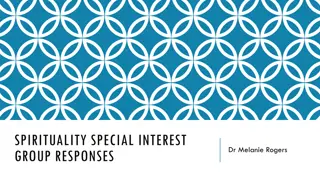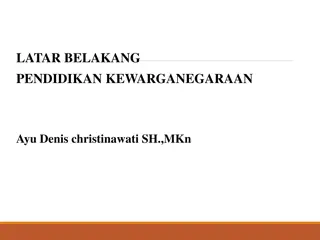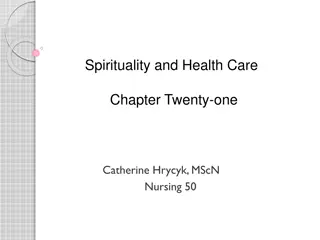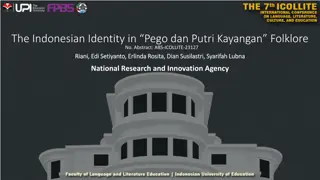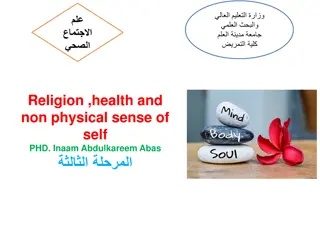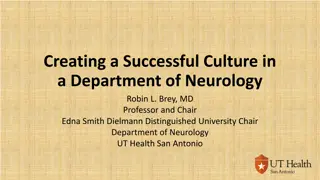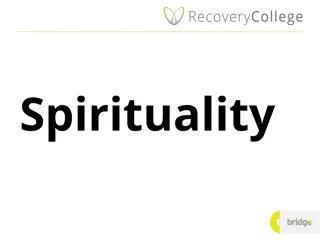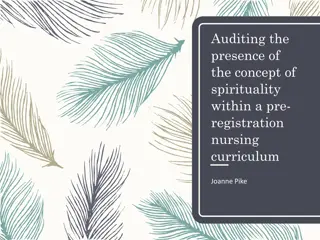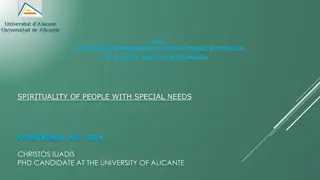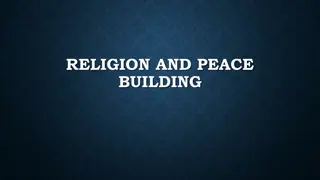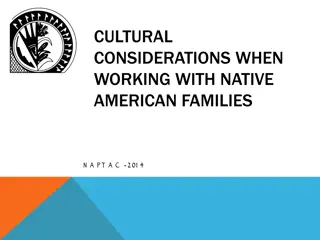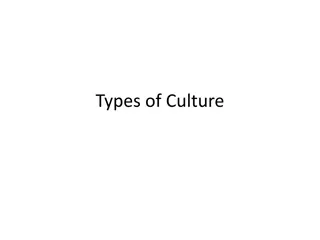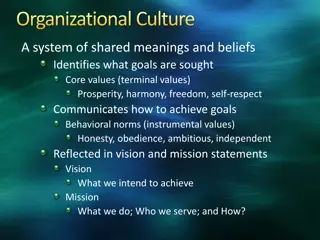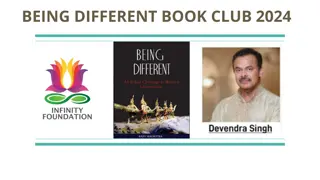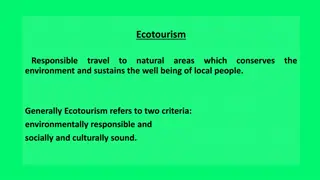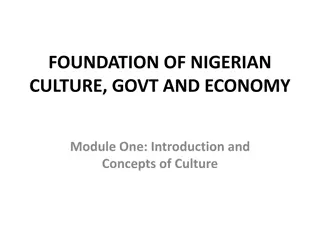Role of Local Culture Masagi in Developing Indonesian Education Spirituality
The article discusses the significance of local culture Masagi in enhancing Indonesian education spirituality to cultivate Insan Kamil, aiming to address moral degradation and build a strong national character through the philosophy of Sundanese local wisdom.
Download Presentation

Please find below an Image/Link to download the presentation.
The content on the website is provided AS IS for your information and personal use only. It may not be sold, licensed, or shared on other websites without obtaining consent from the author. Download presentation by click this link. If you encounter any issues during the download, it is possible that the publisher has removed the file from their server.
E N D
Presentation Transcript
THE ROLE OF LOCAL CULTURE MASAGI IN DEVELOPING INDONESIAN EDUCATION SPIRITUALITY BECOMES INSAN KAMIL Nurti Budiyanti, Maulia D. Kembara, Rama Wijaya A. Rozak, Daris Hadianto D, Pandu Hyangsewu UNIVERSITAS PENDIDIKAN INDONESIA
ABSTRAK The phenomenon of moral degradation moral has spared around the world, this matter can cause moral depletion of the nation and effect social disorientation and culture, as this matter happened in West Java, as the widest province of Muslim live in Indonesia. It is important to strengthen the role of local culture of constructing Indonesian education spirituality in order to become Insan Kamil. This article aims to analyze the role of local culture masagi in developing Indonesian education spirituality. This research uses qualitative approach by descriptive analysis method. The results of research shows that the birth of local culture masagi has great enough role to develop Indonesian education spirituality based on the philosophy of Sundanese local wisdom which emphasize religion, culture, defense the country, and environmental care to anticipate the problem of the low character of the nation, so that the strength of Indonesian Education Spirituality can bring human personality to be Insan kamil. Insan Kamil is the final purpose of human who obey Allah, the final purpose of human who obey Allah are have faith, knowledgeable, noble character and useful for others. Keywords: Roles, Masagi, Educational Spirituality and Insan Kamil
INTRODUCTION A good education is an education that is able to realize the atmosphere of the learning process so that students actively develop their potential to have the spiritual power of religion, personality, intelligence, noble morals, as well as the skills necessary themselves, the people of the Nation and the State, so as to become believers, taqwa and do good deeds (Sa adah, 2014);(Muhajir, 2011);(Bahri, 2017); (Suhartini, 2016);(Parhan et al, 2020); (Jamilah et al., 2014). This is also stated in Law No. 30 of 2003 on the National Education System. Islamic education seeks to make man able to bind themselves to God's guidance, namely religious teachings, a spirituality that has the right reference (Rizal, 2015, hlm. 5); (Sa diyah, 2013);(Farooq Shah et al., 2015). Thus, education actually seeks to give birth to efforts to improve spiritual values, because spiritual will play a role in developing the character of the nation's children. The role of the government is very influential in developing the character of the nation's children, one of which is with efforts to improve spiritual values, including local government. The implementation of education based on local wisdom can be an alternative to the education of the character of the nation and the country, and can certainly play a role in building the spirituality of Indonesian education. Given the importance of education in order to teach children to always be respectful, devoted to parents, love their homeland and homeland, love language, religion, culture, society, nation and country (Tobroni, 2011). Thus, the author is interested in analyzing the role of local culture "masagi" to develop the spirituality of Indonesian education, in order to create a dignified nation with an inherent faith, thus ushering his person into the Role of Insan Kamil.
RESEARCH METHODOLOGY This study aims to analyze the role of local culture "masagi" in developing the spirituality of Indonesian education. This research uses the design of qualitative approaches through non- interactive methods (document analysis). First, researchers gathered information sourced from print, electronic and literature related to the local culture of "masagi" and the concept of educational spirituality. Second, researchers identified a local cultural concept of "masagi" that is suitable for floating the spirituality of Indonesian education. Third, researchers analyzed the role of local culture "masagi". Fourth, map the correlation of masagi culture with educational spirituality. Fifth, researchers conducted data synthesis to then provide an interpretation of the role of local culture "masagi" in developing the spirituality of Indonesian education into Insan Kamil.
FINDING AND DISCUSSIONS Local Cultural Concept "MASAGI" Masagi is derived from the word pasagi which means "square shape", "rectangle" or "square". Masagi wake-up shape has the same four sides and is balanced with an upright position equally sturdy, not easily wobbly. Jalma masagi in the local culture of "masagi" is a human being who has a lot of knowledge and skills. Jalma masagi describes the qualities of sundanese people who are civilized and characterful, namely human beings who are "religious" (nyantri), "cultured" (nyunda) and "academic" (nyakola). Jalma masagi has a balance between physical and spiritual aspects (Suherman, 2018, hlm. 104). It is this physical and spiritual balance that leads people to become to Insan Kamil (Setiawan, 2016);(Budiyanti, Aziz, and Palah, 2020);(Idris, 2017).
Masagi has very strong basic values with spiritual values. The basic values contained in the gate of the local cultural panca waluya "masagi" are the result of a continuous academic dialectic. Therefore, the implementation must also be done inter-inter-inter-community through the practice of trisilas principles, namely silih asah (teaching each other), silih asih (mutual love) and silih asuh (guiding each other)(Suherman, 2018). Through the interaction of silih asah ku pangabisa, silih asih ku pangarti, and silih asuh ku pangaweruh will create a dialogue of incoucinations between members of society in realizing religiously obedient personality, martial arts, cultural love, and environmental care.
Local Cultural Correlation "MASAGI" in Building Educational Spirituality
Thus, the implementation of local culture "masagi" is the values of kesundaan that have long been embraced and implemented by the community, so it is referred to as the value of local wisdom. From the value of local wisdom will be reflected some character of the nation's children namely religious values (faith), intelligent (science), good moral (practice shaleh) both physically and psychically that will then lead people into a religious, cultured and academic generation. So that the end of this character can form the person that Is Insan Kamil.
The Ultimate Goal of Educational Spirituality Becomes a Insan Kamil Spirituality is
CONCLUSION The local culture "masagi" is kesundaan values that have long been embraced and practiced by the community, so it is called the value of local wisdom. Masagi has strong fundamental values with a spiritual value. Jalma masagi describes the quality of Sundanese and civilized human qualities. Jalma masagi has a balance between physical and spiritual aspects. The essence of the values developed by the local culture "Masagi" will be based on Sundanese identity namely cageur, bageur, bener, pinter and singer. This character then creates a generation that is religious, cultured and academic. Until the end of this character can form the generation of Insan Kamil. Insan Kamil was the ideal human being with the highest degree of the creature, because he was aware of his status as ' Abdun, his role as Caliph, his purpose of worship, and his vision of his mission to develop the self-potential of God through educational pathways. If Insan Kamil character is attached, it can easily strengthen the hope generation of people who believe, science, have good morals and beneficial for others. So that the next generation will be much better because spirituality consciousness is inherent in the educational world.
Abdussalam, Aam. 2014. TEORI SOSIOLOGI ISLAM ( Kajian Sosiologis Terhadap Konsep-Konsep Sosiologi Dalam Alquran. Jurnal Pendidikan Agama Islam -Talim 12(1): 2540. Ali, Moh. 2013. IMPLEMENTASI KURIKULUM PENDIDIKAN NASIONAL 2013. Jurnal Pedagogi. Azman, Azlinda, and Syamsuddin. 2012. Memahami Dimensi Spiritualitas Dalam Praktek Pekerjaan Sosial. Informasi 17(02): 111 19. Bahri, Syamsul. 2017. PENGEMBANGAN KURIKULUM DASAR DAN TUJUANNYA. Jurnal Ilmiah Islam Futura. Baldacchino, Donia. 2015. Spiritual Care Education of Health Care Professionals. Religions. Budiyanti, Nurti, Asep Abdul Aziz, and Mohamad Erihadiana. 2020. Strategy of Insan Kamil in Building Green Education. International Journal on Advanced Science, Education, and Religion 3(2): 72 82. Budiyanti, Nurti, ASep Abdul Aziz, and Palah. 2020. THE FORMULATION OF THE GOAL OF INSAN KAMIL AS A BASIS FOR THE. IJECA (International Journal of Education and Curriculum Application) 3(2): 1 10. Budiyanti, Nurti, Ahmad Syamsu Rizal, and Elan Sumarna. 2016. IMPLIKASI KONSEP L L ILMI DALAM AL-QUR` N TERHADAP TEORI PENDIDIKAN ISLAM (Studi Analisis Terhadap Sepuluh Tafs r Mu Tabarah). TARBAWY : Indonesian Journal of Islamic Education. Conroy, J. C., and S. J. McKinney. 2010. Religious and Spiritual Education. In International Encyclopedia of Education,. Dewi, Ernita. 2015. Konsep Manusia Ideal Dalam Persepektif Suhrawardi Al-Maqtul. Substantia 17(1): 41 54. Farooq Shah, Sayyed et al. 2015. Quality and Features of Education in the Muslim World. Universal Journal of Educational Research. Firmansyah, Mokh Iman. 2017. Program Pembudayaan Terpadu Dalam Membina Karakter Islami Pada Siswa Sekolah Dasar Sebagai Implementasi Kurikulum Bandung Masagi. Jurnal Pendidikan Agama Islam - Ta lim 15(2): 91 97. Fridayanti, Fridayanti. 2016. Religiusitas, Spiritualitas Dalam Kajian Psikologi Dan Urgensi Perumusan Religiusitas Islam. Psympathic : Jurnal Ilmiah Psikologi 2(2): 199 208. Gulick, Donna Spring. 2004. THE EVOLUTION OF SPIRITUAL CONSCIOUSNESS: INTERFACE BETWEEN INTEGRAL SCIENCE AND SPIRITUALITY, PAST AND EMERGING. World Futures. Hakiki, Kiki Muhamad. 2018. Insan Kamil Dalam Perspektif Syaikh Abd Al-Karim Al-Jili. Wawasan: Jurnal Ilmiah Agama dan Sosial Budaya. Idris, Saleha. 2017. Insan Kamil : Theological and Psychological Perspectives. Asian Journal of Social Sciences, Arts and Humanities 5(2): 9 28. Jamilah, J. et al. 2014. Integration of Islamic Input in Medical Curriculum - Universiti Sains Islam Malaysia (USIM) Experience. International Medical Journal Malaysia. Juliani, Wikanti iffah, and Hendro Widodo. 2019. Integrasi Empat Pilar Pendidikan (Unesco) Melalui Pendidikan Holistik Berbasis Karakter Di Smp Muhammadiyah 1 Prambanan. Jurnal Pendidikan Islam 10(2): 65 74. Khulaisie, Rusdiana Navlia. 2016. Hakikat Kepribadian Muslim , Seri Pemahaman Jiwa Terhadap Konsep Insan Kamil. Jurnal Refletika. Mahmud, Akilah. 2014. Insan Kamil Perspektif Ibnu Arabi. Sulesana. Mayer, John D. 2000. Spiritual Intelligence or Spiritual Consciousness? International Journal of Phytoremediation. Muhajir, As aril. 2011. Tujuan Pendidikan Dalam Perspektif Al-Qur an. Al-Tahrir: Jurnal Pemikiran Islam 11(2): 237. Neal, Judith A. 1997. Spirituality in Management Education: A Guide to Resources. Journal of Management Education. Nelson, James M. 2009. Psychology, religion, and spirituality Psychology, Religion, and Spirituality. Nuryatno, M. Agus. 2011. Islamic Education in a Pluralistic Society. Al-Jami ah: Journal of Islamic Studies 49(2): 411. Pargament, Kenneth I. 2002. The Bitter and the Sweet: An Evaluation of the Costs and Benefits of Religiousness. Psychological Inquiry. Parhan, Muhamad et al. 2020. Internalization Values of Islamic Education At. International Journal of Psychosocial Rehabilitation 24(08): 14778 91. Qasimi, Ja Far. 2013. The Life of The Prophet. Islamic Spirituality: Foundations: 65 96. Rizal, Ahmad Syamsu. 2015. Orientasi Dan Konteks Sosial Pendidikan Islam (Memahami Dimensi Eksiologis Pendidikan Islam). Jurnal Pendidikan Agama Islam - Ta lim 13(1): 1 15. Rohana, Etep. 2019. Character Education Relation with Spiritual Intelligence in Islamic Education Perspective. International Journal of Nusantara Islam 6(2): 165 74. Sa adah, Mazro atus. 2014. ARAH PENDIDIKAN ISLAM DALAM AL-QUR AN. At-Tajdid: Jurnal Ilmu Tarbiyah. Sa diyah, Halimah. 2013. Spiritualitas Pendidikan Islam Perspektif Syed Muhammad Naquib Al-Attas. Tadris Vol.8(2): 158 77. Setiawan, Wahyudi. 2016. The Spiritual Education Toward Insan Kamil in the Education of Modern Humankind. (October): 0 7. Silvia Nur Aulia, Elsa. 2016. Islamic Character Building, Membangun Insan Kamil, Cendikia Berakhlak Qur ani. Jurnal Sosioteknologi. Smith, Jonathan A., and John J. Rayment. 2007. The Global SMP Fitness Framework: A Guide for Leaders Exploring the Relevance of Spirituality in the Workplace. Management Decision. Sodiman. 2014. Menghadirkan Nilai-Nilai Spritual Tasawuf Dalam Proses Mendidik. Jurnal Al-Ta dib 6(1): 330 44. Sudirman, Subhan Ajrin. 2017. Pengaruh Spiritualitas Terhadap. (October): 133 52. Suhardi, Didik, Direktur Pembinaan, Smp Ditjen, and Dikdas Kemdikbud. 2012. Peran Smp Berbasis Pesantren Sebagai Upaya Penanaman Pendidikan Karakter Kepada Generasi Bangsa Boarding School-Based Smp Role As an Effort To Implement Character Education for Nation S Successor. Pendidikan Karakter. Suhartini, Andewi. 2016. The Internalization of Islamic Values in Pesantren. Jurnal Pendidikan Islam. Suherman, Agus. 2018. Jabar Masagi: Penguatan Karakter Bagi Generasi Milenial Berbasis Kearifan Lokal. Lokabasa 9(2): 107. Sujana, I Wayan Cong. 2019. FUNGSI DAN TUJUAN PENDIDIKAN INDONESIA. Adi Widya: Jurnal Pendidikan Dasar. Tischler, Len, Jerry Biberman, and Robert Mckeage. 2002. Linking Emotional Intelligence, Spirituality and Workplace Performance:Definitions, Models and Ideas for Research. Journal of Managerial Psychology. Tobroni. 2011. Pengembangan Pendidikan Karakter Bangsa Berbasis Kearifan Lokal. Jurnal Ilmu-ilmu Sosial. Yuliana, E. Dewi. 2010. Pentingnya Pendidikan Karakter Bangsa Guna Merevitalisasi Ketahanan Bangsa. Udayana Mengabdi. Zohar, Danah, and Ian Marshall. 2000. Kecerdasan Spiritual. Blomsbury, Britain: 3 16. REFERENCE
Assalamualaikum Wr.Wb Alhamdulillah ^^ - - - -



